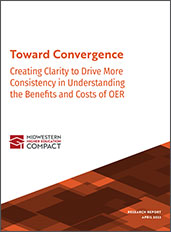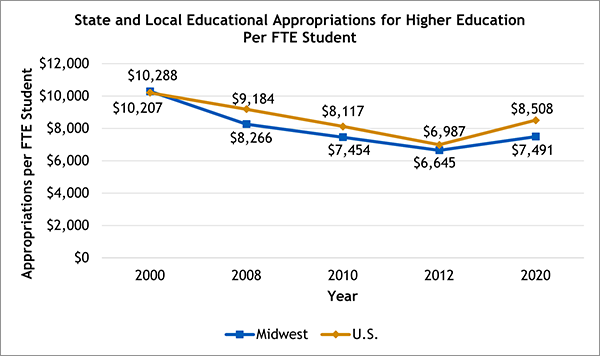MHEC News April 2022
MHEC News summarizes key policy and research, convenings, programs, contracts, articles of interest, and updates for members of the Midwestern Higher Education Compact. We welcome your feedback and suggestions.
POLICY & RESEARCH
New Report Offers Guidance on How to Calculate Benefits of Open Educational Resources
Frameworks Help Evaluate OER as Universities Seek Cost Savings for Students
 With colleges and universities increasingly turning to freely accessible open educational resources (OER) to reduce growing higher education costs, institutions and state policymakers need a more consistent way to understand and discuss student cost savings and other OER benefits.
With colleges and universities increasingly turning to freely accessible open educational resources (OER) to reduce growing higher education costs, institutions and state policymakers need a more consistent way to understand and discuss student cost savings and other OER benefits.
Informed by institutional, state, and national leaders, a report from the Midwestern Higher Education Compact (MHEC) as part of a partnership with National Consortium for Open Educational Resources (NCOER) describes six principles to help define efforts to identify savings and returns from OER investments and offers two frameworks for making those calculations. Throughout the report are examples and artifacts of how others are approaching these determinations.
Interactive Dashboard Highlights Higher Ed Funding per Student
MHEC’s Interactive Dashboard provides the latest data on state and local educational appropriations for public higher education per full-time equivalent (FTE) student. The figure below shows that state and local government funding for public higher education in the Midwest and nation declined between 2000 and 2012 but has since increased. While funding for higher education in the Midwest has generally been lower than the national average, the interactive dashboard shows that some states in the Midwest funded public higher education at levels above the national level in 2020, including Illinois, Nebraska, and North Dakota.
State and local educational appropriations for higher education include funds used for public institutional operating expenses and public student financial aid. These appropriations exclude spending for research, agriculture-related programs, medical education, and nonoperating expenses such as capital outlays, as well as support for independent institutions or students attending them.
MHEC’s Interactive Dashboard provides additional ways to visualize this data using bar charts, line graphs, maps, and tables. Selected finance indicators are also available for MHEC states in the report Higher Education in Focus.
Source: SHEEO. (2021). State Higher Education Finance: FY 20. Estimates have been adjusted for inflation to 2020 dollars using the Higher Education Cost Adjustment.
Midwest Credential Transparency Alliance Panel to Share Examples of Learning and Education Records in Member States; RFP for Mini-Grants Announced
The Midwest Credential Transparency Alliance (MCTA), a collaborative initiative focused on advancing credential transparency across the Midwest, will meet May 19 to share examples of how states are exploring Learning and Education Records (LERs) or Comprehensive Learner Records (CLRs) to advance credential transparency.
Panelists will include national experts and colleagues from within the Midwest who are exploring these opportunities. The meeting will also provide an opportunity to discuss progress on establishing the cybersecurity credentials and pathways across the Midwest and learnings from a recent survey on legislation and policies in place across the Midwest in support of career and technical education pathways.
RFP for Mini-Grants
Additionally, MHEC and Credential Engine, who are partnering on the initiative, invite eligible entities of MHEC members states to submit proposals for mini-grants of up to $20,000 designed to support progress towards credential transparency goals and serve as examples for other participating states as part of MCTA. The deadline is April 27, at 5 p.m. CT.
If you would like to participate, please indicate your interest by signing up for the MCTA list server to stay informed. View the MCTA’s webpage for background on the initiative and materials from prior meetings.
CONVENINGS
WEBINAR
Concurrent Enrollment Coordinators on Graduate Credit Quest: A new tool to help coordinators help teachers find graduate courses
May 4, 2022
11:00 a.m. CT
Join MHEC staff for the next webinar about Graduate Credit Quest (GCQ), our online platform to help concurrent enrollment teachers find the graduate courses they need to meet instructor qualification expectations established by the Higher Learning Commission (HLC). The webinar, designed for concurrent enrollment program coordinators in schools, will introduce them to our new portal created specifically for them. The GCQ tool offers a way for program coordinators to connect with their teachers, recommend courses, and keep track of teachers’ graduate credits and online communications with teachers. The site also contains information about concurrent enrollment work in each of the 12 MHEC member states as well as concurrent enrollment news and research. Best of all, participation is absolutely free to universities, coordinators, and teachers!
Resources from Past Events
Toward Convergence: Creating Clarity to Drive More Consistency in Understanding the Benefits and Costs of OER This April 13 webinar highlighted the release of MHEC's new report on methods for gauging the value and impact of Open Educational Resources (OER) to states. Presenters: Tim Anderson, Minnesota State; Eddie Watson, American Association of Colleges and Universities; Katie Zaback, Zaback Consulting; and Jenny Parks, MHEC
Building a Culture of Information Security This April 12 webinar outlines an approach for identifying an information security framework, customized to fit the needs of your institution, assessing processes, and integrating the framework into the everyday practices, policies, and culture of your college or university. Also explored, are the people side of information security and how users' well-being can affect their behavior online. Presenters: Joe Traino, Brian Hadley, Vienna Morrill, and Tyler Bartlett from BerryDunn
Mental Health Challenges During the Pandemic and Beyond: Mitigating Risk for Students, Faculty, and Staff This April 7 webinar provides a timely and informative focus on current mental health trends on college campuses, the impact of the pandemic and suggested strategies for mitigating risk. Also shared, are ways campuses can effectively support students, faculty, and staff in managing mental health. Presenter: Nance Roy, Jed Foundation
Streamlining the Army Tuition Assistance Program: Kansas State University's Blueprint for Simplification This March 24 webinar provides an overview of Kansas State University's process to streamline military-connected students through the Army’s Tuition Assistance (TA) Program. The TA Program provides financial assistance for voluntary off-duty civilian education programs in support of a soldier's professional and personal self-development goals. TA is a public law that is implemented by the Department of Defense Directive and Instruction. Presenters: Dominic Barnes, Kelly Brundage, and Kimberly Sablan, Kansas State University
Highlighting Pathway to 18, Graduate Credit Quest In this Minnesota State webinar series MHEC's Graduate Credit Quest, a website offering a searchable database of graduate courses offered by Midwestern universities for high school teachers is highlighted on the March 29 session. The seven universities of the Minnesota State system created Pathway to 18 to help high school teachers get the credentials they need quickly and affordably. Presenter: Jenny Parks, MHEC
COMMISSIONER NEWS
Representative Jon Cross
Chair, Finance Subcommittee on Higher Education
Ohio Legislature
Term: 3/8/2022 to 1/1/2023
Senator Scott Bennett
Chair, Higher Education
Illinois General Assembly
Term: 4/1/2022 to 6/30/2024
Congratulations to Our Commissioners
Retirements
Teresa Lubbers, Commissioner, Indiana Commission for Higher Education
Lubbers delivers final address, outlines need for further changes in higher education
Commissioner Spotlight: Indiana's Teresa Lubbers
Janelle Toman, Director of Communications, South Dakota Board of Regents
The Board of Regents thanks Dr. Janelle Toman for her years of service and dedication
New Position
Bill Pink, president of Grand Rapids Community College, was selected as the finalist to become the next president of Ferris State University. The university’s Board of Trustees are expected to vote Friday, May 6, to confirm him as the 19th president of the University.
State Visits Update
Susan Heegaard, MHEC president, and Rob Trembath, MHEC chief operating officer and general counsel, met with state higher education, legislative, and executive branch leadership in Springfield, Illinois on March 29-30. Ms. Heegaard, along with Jennifer Dahlquist, MHEC vice president, and Katie Chock, MHEC senior meeting, event, and operations manager, visited Columbus, Ohio on April 6-7. The next scheduled visit is with Minnesota on April 21, Michigan on April 26, Wisconsin on April 27, and North Dakota on May 2-3. MHEC has been invited by Representative Mark Sanford, chairman of the North Dakota Higher Education Committee, to give a presentation on May 2.
TEAM UPDATES
Jenny Parks, MHEC vice president, presented at the Higher Learning Commission's 2022 Annual Conference "Evolving Together" on April 3. Ms. Parks along with with Amy Williams, executive director of the National Alliance of Concurrent Enrollment Partnerships, and Jennifer Zinth, founder and principal of Zinth Consulting, LLC, provided an overview of the factors contributing to the concurrent enrollment teacher credentialing challenge. They also highlighted emerging state and local strategies to address the challenges that are summarized in the 2022 report, Building a Concurrent Enrollment Teacher Pipeline: Opportunities, Challenges and Lessons.
Sara Appel, MHEC associate director for policy initiatives, attended the Credit for Prior Learning Shared Solutions Work Group meeting on March 30-31. The work group includes national, state, and local leaders representing secondary, postsecondary, and workforce to identify strategies for building a robust and fully equitable system of credit for prior learning policies and practices that supports career pathway completion and credential attainment. The objective of the meeting focused on creating a comprehensive policy benchmark tool to guide the field in improving credit for prior learning policies and practices.
ARTICLES AND RESOURCES OF INTEREST
Code-red moment': Fewer people going to college in Minnesota could reshape higher education, workforce
Colleges in Minnesota and nationwide are at a crossroads
Star Tribune | April 16, 2022
The 101 on OERs: This new report spells out 6 key principles for adoption in higher ed
University Business | April 15, 2022
Finding the 'recipe' for calculating OER benefits
EdScoop | April 13, 2022
Report: Public Research Universities Spent 70% of Federal Pandemic Relief
Higher Ed Dive | April 6, 2022
Should Colleges Be Worried by Threats of Russian Cyber Attacks on the U.S.?
University Business | April 5, 2022
Lawmakers Pass Ban on Withholding College Transcripts
Daily Herald | March 30, 2022
Q&A: A Closer Look at Credentials
Community College Daily | March 29, 2022
FAFSA Requirements Aim to Boost College Enrollments. Here’s Their Impact So Far.
The Chronicle of Higher Education | March 28, 2022
Community College Enrollment is Down, but Skilled-trades Programs are Booming
NPR | March 28, 2022
Rodríguez: Drop in College Enrollment Threatens Our Economy
San José Spotlight | February 2, 2022